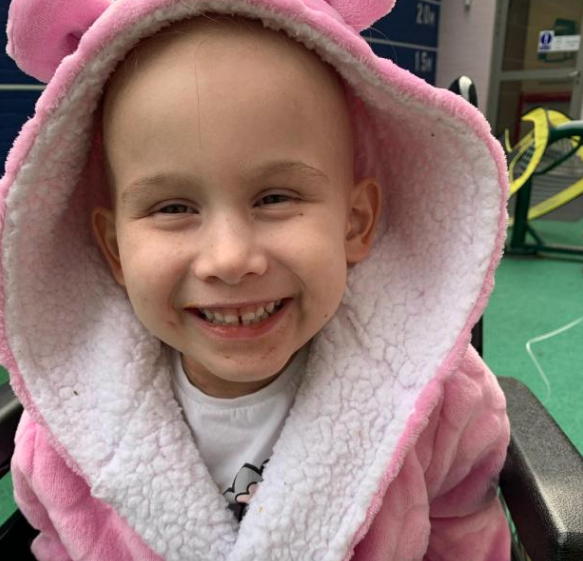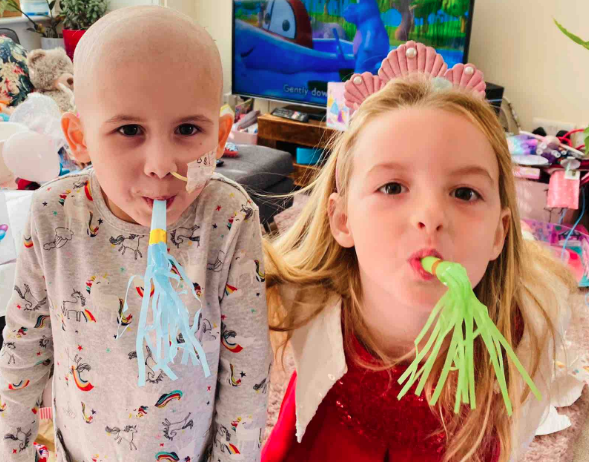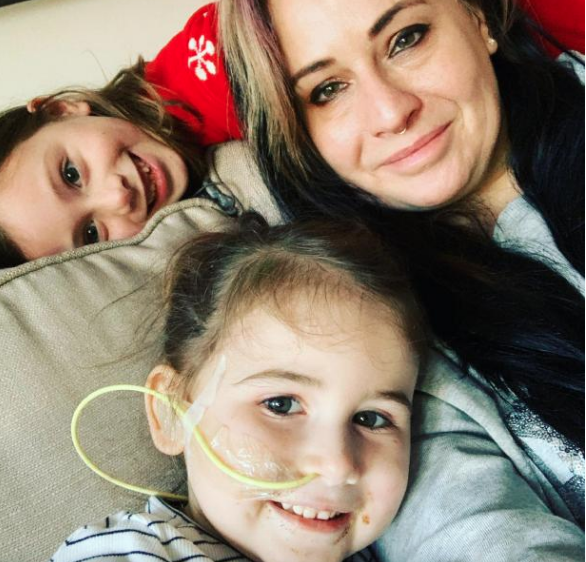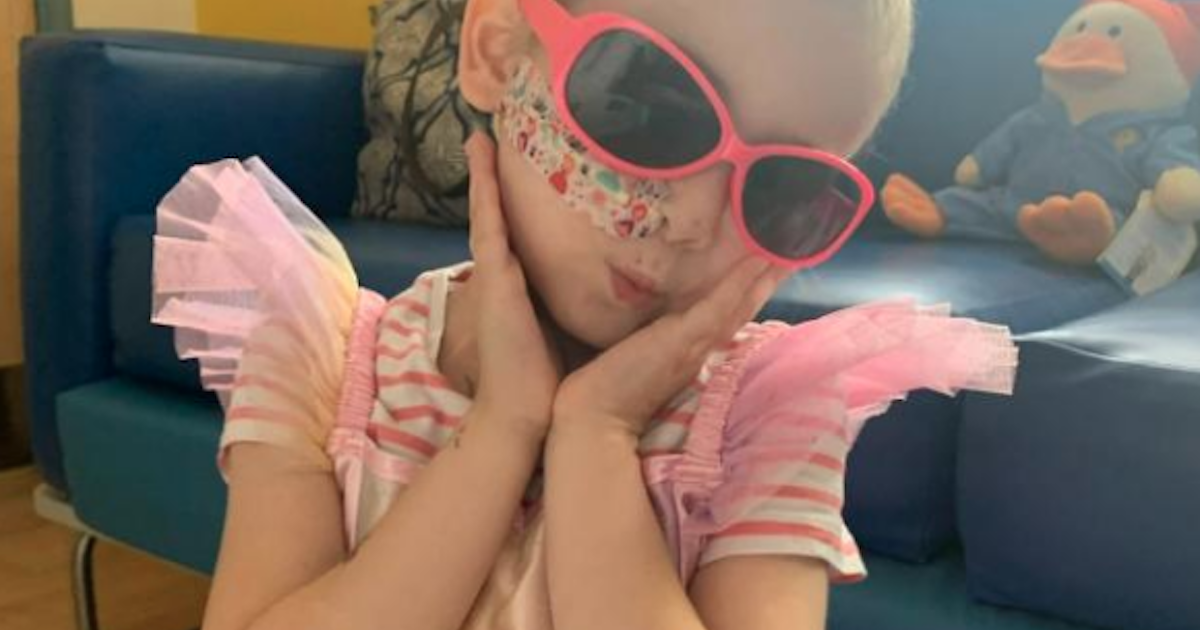A brave little girl is battling a very big disease that almost went undetected after doctors initially misdiagnosed her symptoms.
Charlotte “Charlie” West, 5, experienced months of exhaustion and pain that doctors insisted were just “growing pains” before learning she had stage IV neuroblastoma, a cancer that develops from immature nerve cells found in several areas of the body.
Read More
A Neuroblastoma Diagnosis
Angela West first took her daughter Charlie, then 4, to see a doctor in the Fall of 2020 after she complained of pain in her toes, neck, and legs.
The young girl who was “always so ready for life,” according to her mother, had also become increasingly tired, struggled to walk, and frequently declined to eat meals because she had no appetite.
“Her teachers at preschool had noticed she wasn’t eating her lunch and just wasn’t right,” recalled Angela on a GoFundMe page set up by the family. “I took her to the [doctor] and they checked her vitals and put it down to growing pains.”
Angela accepted the diagnosis but did not hesitate to take Charlie back to the hospital when she said the pain traveled to her back. She did this not once, but twice before her daughter got the correct diagnosis.
Scans showed that Charlie had a mass near her adrenal gland that looked to be neuroblastoma, an observation that doctors later confirmed when they did a biopsy.
Doctors delivered those results to the family just days before Christmas.
Related: Vietnam Veteran Gives 2-Year-Old Boy Fighting Metastatic Neuroblastoma His Bronze Star

Treating Neuroblastoma
The cancer had already started to spread, so Charlie never left the hospital and began a grueling course of treatment in hopes of beating the disease.
The treatment started with “80 days of intensive chemotherapy to shrink the [tumor]” followed by six additional weeks of another chemotherapy when the first failed to shrink the cancerous growth.
Stem cell harvesting and cryotherapy followed, after which Charlie had the operation to remove her tumor.
Once out of surgery, Charlie began a “grueling high-dose chemotherapy and stem cell replacement” that wreaked havoc on the youngster and put her in intensive care for eight weeks.
According to her mother, Charlie is still not done with treatment. Radiation and immunotherapy are still to come.
“Doctors say that the treatment Charlie is getting, an adult would struggle to cope with,” said her mother in an interview with The Argus. "It's been really intense and rapid.”

Keeping a Positive Attitude
She said that this battle has done nothing to dim Charlie’s sparkle, though, noting: “Luckily, the kids keep their whole personality through it all, and that's what keeps you going.”
Charlie, meanwhile, does not seem fazed by her weight and hair loss or the tube that feeds into her nose and makes her look “so ill.”
"Wherever we go, kids look at her, but I don't think she ever notices,” said Angela.
The family also had a big scare just days before Charlie’s fifth birthday in October.
“[Charlie] went into septic shock [in early October]. She was put in an induced coma and onto a ventilator,” shared her mother.
She went on to say that Charlie was “on the mend” and her immunotherapy delayed so that she could fully recover before continuing with her treatment.
Charlie is now back in school again, but the family worries that the cancer might return even after this intense treatment. That is why they are hoping to raise enough money so that their daughter can travel to New York City and receive treatment at Memorial Sloan Kettering Cancer Center.
The Side Effects of Chemotherapy
No two chemotherapy drugs are precisely alike, and most people who undergo this treatment in their cancer battle will experience at least one side effect.
Charlie experienced no adverse reactions of note to her first two chemotherapy drugs, while the third wreaked havoc on the young girl’s body.
“Chemotherapy affects the body by inhibiting cancer cells from dividing. But of course, it also inhibits normal cells from dividing,” explains Dr. Lawrence Piro, an oncology specialist affiliated with Cedars-Sinai Marina del Rey Hospital.
“So, its side effects can be, in some cases, hair loss, in some cases mouth sores from affecting the lining of the mouth, of the stomach. Nausea, sometimes vomiting.”
However, the most significant side effect is the risk of infection because chemotherapy tends to lower the number of blood cells.
“It lowers your white blood cells, which puts you at risk for infection. It lowers the red blood cells, which makes you anemic. And it lowers the small platelets fragments of cells that are important in blood clotting, and that could give you a risk for bleeding,” says Dr. Piro.
As a result, infusions can be necessary at times to help patients fight off infection during treatment.
For patients like Charlie, being in the ICU would allow for a quicker response should she experience a sudden side effect or need an infusion.
Communicating With Your Doctor During Chemotherapy
Managing the Side Effects of Chemotherapy
For Dr. Erin Crane, an oncologist at Levine Cancer Institute Morehead in North Carolina, preparing patients for the likely side effects of their chemotherapy treatment plays a significant part in her approach to cancer care.
“I think the biggest part of our jobs, whether it be from cancer diagnosis to counseling patients, is to reassure them that they’ll get through it and they’ll be okay,” says Dr. Crane. “So a big part of what I do when I talk to patients about the side effects and explain to them that many of the fears they have about the side effects of chemotherapy are manageable.”
That means telling them that medication can treat the nausea and vomiting and assuring them that their fatigue will eventually disappear.
“I do counsel patients that fatigue is one of the side effects that tend to get progressively harder to recover from with chemotherapy,” says Dr. Crane. “But once chemotherapy is over, within a few months, most patients regain their energy levels back.”
There are also steps patients can take, says Dr. Crane, who notes that being active can make a world of difference.
“I think it’s important for patients to try and remain as active as possible,” she says. “And I know that of course, they don’t want to push themselves until they’re not feeling well, but trying to incorporate physical activity like going for a walk every day, doing things around the house to remain active really can help combat some of that fatigue and keep patients in better shape so that they’re better able to recover from chemotherapy and get back to normal when they’re done with treatment.”
Treating and Preventing Chemotherapy Side Effects
Learn more about SurvivorNet's rigorous medical review process.

